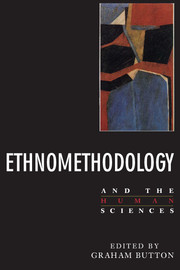Book contents
- Frontmatter
- Contents
- Contributors
- Preface
- 1 Introduction: ethnomethodology and the foundational respecification of the human sciences
- 2 Respecification: evidence for locally produced, naturally accountable phenomena of order, logic, reason, meaning, method, etc. in and as of the essential haecceity of immortal ordinary society (I) – an announcement of studies
- 3 Logic: ethnomethodology and the logic of language
- 4 Epistemology: professional scepticism
- 5 Method: measurement – ordinary and scientific measurement as ethnomethodological phenomena
- 6 Method: evidence and inference – evidence and inference for ethnomethodology
- 7 The social actor: social action in real time
- 8 Cognition: cognition in an ethnomethodological mode
- 9 Language and culture: the linguistic analysis of culture
- 10 Values and moral judgement: communicative praxis as moral order
- References
- Index
10 - Values and moral judgement: communicative praxis as moral order
Published online by Cambridge University Press: 05 June 2012
- Frontmatter
- Contents
- Contributors
- Preface
- 1 Introduction: ethnomethodology and the foundational respecification of the human sciences
- 2 Respecification: evidence for locally produced, naturally accountable phenomena of order, logic, reason, meaning, method, etc. in and as of the essential haecceity of immortal ordinary society (I) – an announcement of studies
- 3 Logic: ethnomethodology and the logic of language
- 4 Epistemology: professional scepticism
- 5 Method: measurement – ordinary and scientific measurement as ethnomethodological phenomena
- 6 Method: evidence and inference – evidence and inference for ethnomethodology
- 7 The social actor: social action in real time
- 8 Cognition: cognition in an ethnomethodological mode
- 9 Language and culture: the linguistic analysis of culture
- 10 Values and moral judgement: communicative praxis as moral order
- References
- Index
Summary
Introduction
The question of ‘values’ and moral judgement has pervaded the human sciences and philosophy since their inception. This chapter will deal with the way this question has been formulated and pursued in sociology and moral philosophy, the problems that arose with the different formulations, and the ethnomethodological respecification of the base problematic. It was within sociology (as distinct from economics, political science, or psychology) that the issue of ‘values’ in social science was most significantly topicalised, and it was from within sociology that the ethnomethodological respecification of the domain of human scientific inquiry originated. At the same time, it was moral philosophy that made the sustained and systematic exploration of moral and ethical matters an object for attention, developing on, and addressing, some of the same philosophical antecedents that informed modern social science.
The question of ‘values’ has classically had two prongs to it. On the one hand there is the conceptualisation and study of the relationship of ‘values’ to human conduct; on the other hand there is the conceptualisation and study of the relationship of ‘value’ to human inquiry. For sociology (until the ethnomethodological turn) the latter problematic has been paramount; for moral philosophy, the former problematic has been the central one, leaving the latter to other sub-branches of philosophy. Throughout both these domains of inquiry, however, the problematics have been articulated around a central set of axes (distinct but interdependent) which shall provide the pivot for this discussion: (1) the distinction between ‘fact’ and ‘value’; (2) the is/ought dichotomy; (3) the problem of ‘relativism’ versus ‘objectivity’, and (4) the related issue of ‘moral diversity’.
- Type
- Chapter
- Information
- Ethnomethodology and the Human Sciences , pp. 227 - 251Publisher: Cambridge University PressPrint publication year: 1991
- 116
- Cited by



